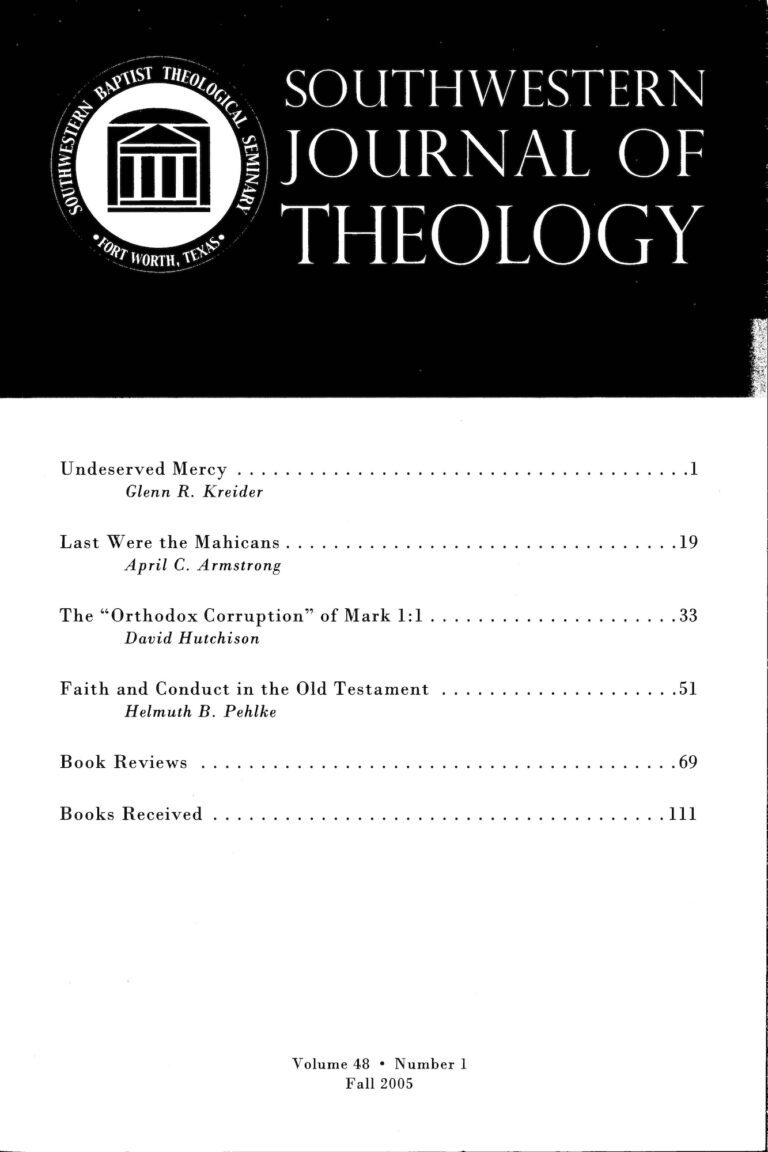
Southwestern Journal of Theology (48.1)
Southwestern Journal of Theology
Volume 48, No. 1 - Fall 2005
Editor: Paige Patterson
Edited by R. C. Sproul. Lake Mary, FL: Ligonier Ministries, 2005. xvii + 1948 pages. Hardcover, $39.99; Leather bound, $69.99.
Through its textual and theological apparatuses, The Reformation Study-Bible (RSB) seeks to present a reformed or Calvinistic version of the study Bible. Under the general editorship of R. C. Sproul, Presbyterian author and long time chairman of Ligonier Ministries, the RSB features the English Standard Version (ESV) translation of the Bible (2001). The RSB apparatuses contain many features common to study Bibles: thousands of exegetical notes, a cross-referencing system (from the ESV), introductions and outlines to each biblical book, several dozen black and white maps in the text, and a seventy-two page concordance. The unique features of the RSB include the ninety-six theological mini-essays which appear throughout the text addressing issues such as the image of God, the Trinity, and the church’s mission in the world. These essays are packed with theology from a reformed point of view. Also noteworthy are the “Interpretive Difficulties” sections found in many of the book-introductions which address some of the more thorny issues of evangelical biblical scholarship: the documentary hypothesis and Genesis, the date of the Exodus, the unity of Isaiah, the chronology of the events presented in the synoptic gospels, and the various approaches to interpreting Revelation.
The theology found in the notes of the RSB is decidedly reformed, a feature of which any Baptist who picks up the work should be aware. A perusal of the more than fifty editors and contributors to the notes reveals only two Baptist theologians that I am aware of (Roger Nicole and Wayne Grudem), though admittedly there may be more. Most Baptists will welcome the conservative theological vision found in the RSB’s notes on the doctrines of God, justification, and scripture. Other notes however will not elicit the applause of many Baptists. For instance, the reformed teaching of limited atonement, an age-old point of contention between high Calvinistic Baptists and other Baptists, is clearly affirmed in the RSB’s notes. The “world” that God so loved (John 3:16) and whose sins are propitiated by Christ (1 John 2:2) is not everyone indiscriminately but the world of the elect. God desires not “all people [indiscriminately] to be saved” (1 Tim. 2:4) but “all types of people” to be saved (1752). We read in the notes that, “When ‘the world’ is said to be loved and redeemed (John 3:16, 17; 2 Cor. 5:19; 1 John 2:2), that ‘world’ is the great number of God’s elect scattered worldwide, in every nation” (858). While this is evidence of “high” Calvinism among the editorship, the following should be pointed out: double predestination is not affirmed in the notes (i.e., reprobation is merely God “not choosing” the non-elect; 1630), Christians are called to preach the gospel to the world (ibid.), and Christian worship should not be restricted only to the non-instrumental singing of the Psalms (1734). These positions indicate that the editors are aiming at representing the reformed evangelical mainstream, not its parochial fringe.
Other markers of reformed theology—such as the affirmation of a covenant of works, the three-fold purposes of the Law, and an amillennial eschatology (found in the introduction to the book of Revelation)— would disturb the sensibilities of any Baptist who has imbibed a dispen-sational vision of salvation history. Similarly, Baptists concerned about pure Baptist ecclesiology will not be pleased with the affirmation (1623) that all three modes of baptism (immersion, dipping, and sprinkling) are consistent with scripture. However, the essay on “infant baptism” (37) does interestingly engage the Baptist position on believers baptism in a relatively non-polemical way, evidence that the editors are aware of the potential market the RSB might have among reformed Baptists.
There are no neutral study Bibles. Each of them has a certain audience in mind and a certain theological orientation it seeks to promote. This one is no exception. The RSB unabashedly seeks to promote a reformed reading of Holy Writ, and at times does not deal adequately with other alternative readings. At the same time, it is an excellent resource for Christians from the reformed corridors of evangelicalism who want to know the Bible better and to be introduced to the deeper levels of theology. As one who has affinities for the broader outlines of a Baptist reformed theology, I would recommend this study Bible to Christians who want an introductory theological grounding in the scriptures. For those, however, who have some maturity in their knowledge of scripture-long-time Bible students, M.Div. students, ministers, Bible educators in colleges and seminaries—the best Bibles I would recommend are still the ones that just come with the naked biblical text!





